書籍・報告書 検索
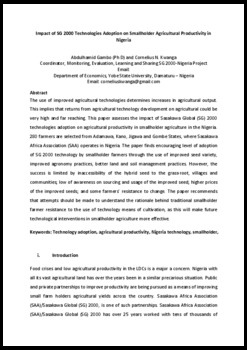
書籍・報告書 / 報告書
Impact of SG 2000 Technologies Adoption on Smallholder Agricultural Productivity in Nigeria
January.31.2017
This paper assesses the impact of Sasakawa Global (SG) 2000 technologies adoption on agricultural productivity in smallholder agriculture Nigeria. 280 farmers are selected from Adamawa, Kano, Jigawa and Gombe States, where Sasakawa Africa Association (SAA) operates. The paper finds encouraging level of adoption of SG 2000 technology by smallholder farmers through the use of improved seed variety, improved agronomy practices, better land and soil management practices. However, the success is limited by inaccessibility of the hybrid seed to the grass-root, villages and communities; low of awareness on sourcing and usage of the improved seed; higher prices of the improved seeds; and some farmers’ resistance to change.
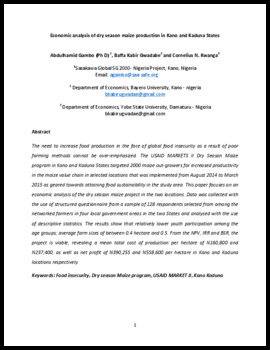
書籍・報告書 / 報告書
Economic analysis of dry season maize production in Kano and Kaduna States 2014-2015
January.31.2017
The USAID MARKETS II Dry Season Maize program in Kano and Kaduna States targeted 2000 maize out-growers for increased productivity in the maize value chain in selected locations that was implemented from August 2014 to March 2015 as geared towards attaining food sustainability in the study area. This paper focuses on an economic analysis of the dry season maize project.
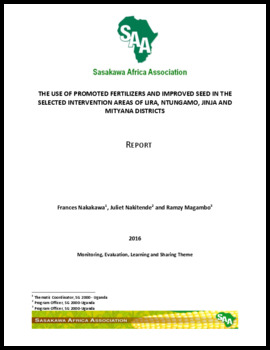
書籍・報告書 / 報告書
The Use of Promoted Fertilizers and Improved Seed in the Selected Intervention Areas of Lira, Ntungamo, Jinja and Mityana Districts
December.1.2016
The overall objective of this study is to have evidence on the use and adoption of selected technologies particularly; fertilizer and improved seeds.
Data collected from randomly selected farmers in the intervention areas of Lira, Ntungamo, Jinja and Mityana districts revealed 60% of the sample size expressed awareness and having knowledge on improved maize crop varieties mainly through trainings by SG2000-U. Overall, 87% of the sample was using improved seed while 78% were using fertilizer although at different intensities.
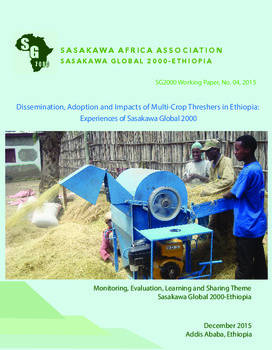
書籍・報告書 / 報告書
Dissemination, Adoption and Impacts of Multi-Crop Threshers in Ethiopia
December.1.2016
SG2000 has promoted improved postharvest technologies such as maize shellers, multi-crop threshers, improved storage structures and others in different parts of the country. This study was initiated to assess the adoption, dissemination and impact of multicrop threshers (MCTs) in selected SG2000 project sites, and to draw lessons from successful adoption of the technology. The study was conducted in selected SG2000 project sites where multi-crop threshers were promoted. Survey was conducted in Arsi Negele, Shashemene and Siraro Woredas of West Arsi Zone in 2013. And in 2014, another survey was conducted to assess lessons from successful promotion and adoption of the MCTs.
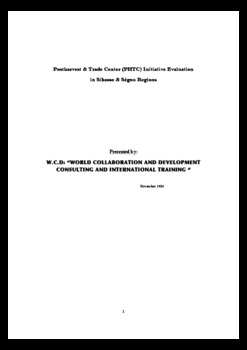
書籍・報告書 / 報告書
Postharvest & Trade Center (PHTC) Initiative Evaluation in Sikasso & Ségou Regions
October.31.2016
This report studies the effects of Postharvet & Trade Center established in Sikasso and Ségou Regions in Mali, a platform aiming to reduce postharvest losses and to improve income through providing warehousing and storage services, and linking farmers to reliable markets.



